Abstract
BACKGROUND: Detection of p53 antibodies in serum might be an effective indirect procedure to detect alterations of the p53 gene. AIMS: To assess the prevalence and the variation under treatment of p53 antibodies in patients with colorectal cancer. PATIENTS AND METHODS: Fifty four patients with colorectal cancer (26 men and 28 women, mean age 65, range 33-90 years) and 24 patients with non-malignant digestive disease were tested for p53 antibodies by enzyme linked immunosorbent assay (ELISA), and for the carcinoembryonic antigen and carbohydrate antigen 19.9. Immunohistochemical detection of p53 protein tumour overexpression was performed in 38 cases. RESULTS: Fourteen patients (26%) with colorectal cancer but none of those with non-malignant disease displayed p53 antibodies. Overexpression of p53 was shown by immunohistochemistry in 22 patients (58%), 10 of whom also had p53 antibodies. The antibodies were present in four patients with high carcinoembryonic antigen and three patients with high carbohydrate antigen 19.9 concentrations, but also in 10 patients (33.3%) with normal values of these markers. The ratio of p53 antibodies decreased in 11 of 13 patients after tumour resection. In two patients variations in p53 ratio strongly correlated with tumour relapse or progression. CONCLUSION: Testing for serum p53 antibodies constitutes a useful technique for assessing alterations in p53 and may help physicians to follow up patients with colorectal cancer.
Full text
PDF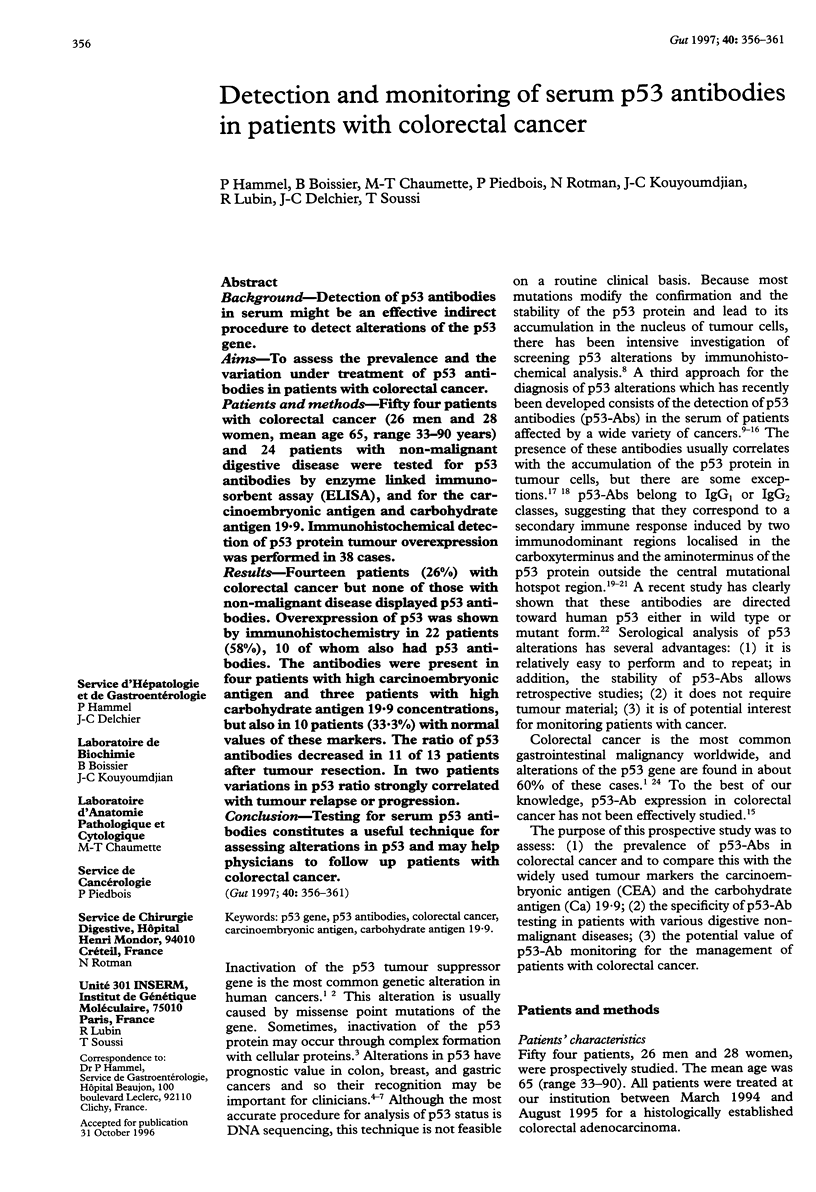
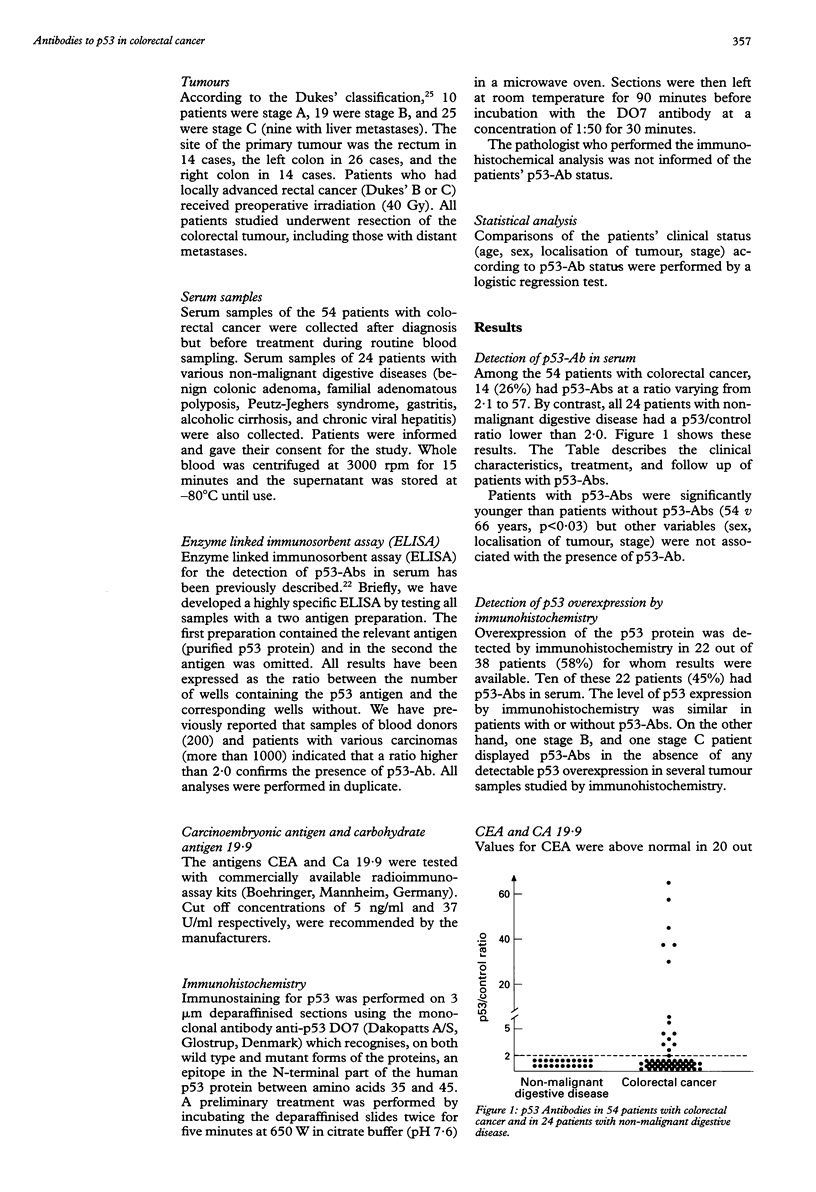

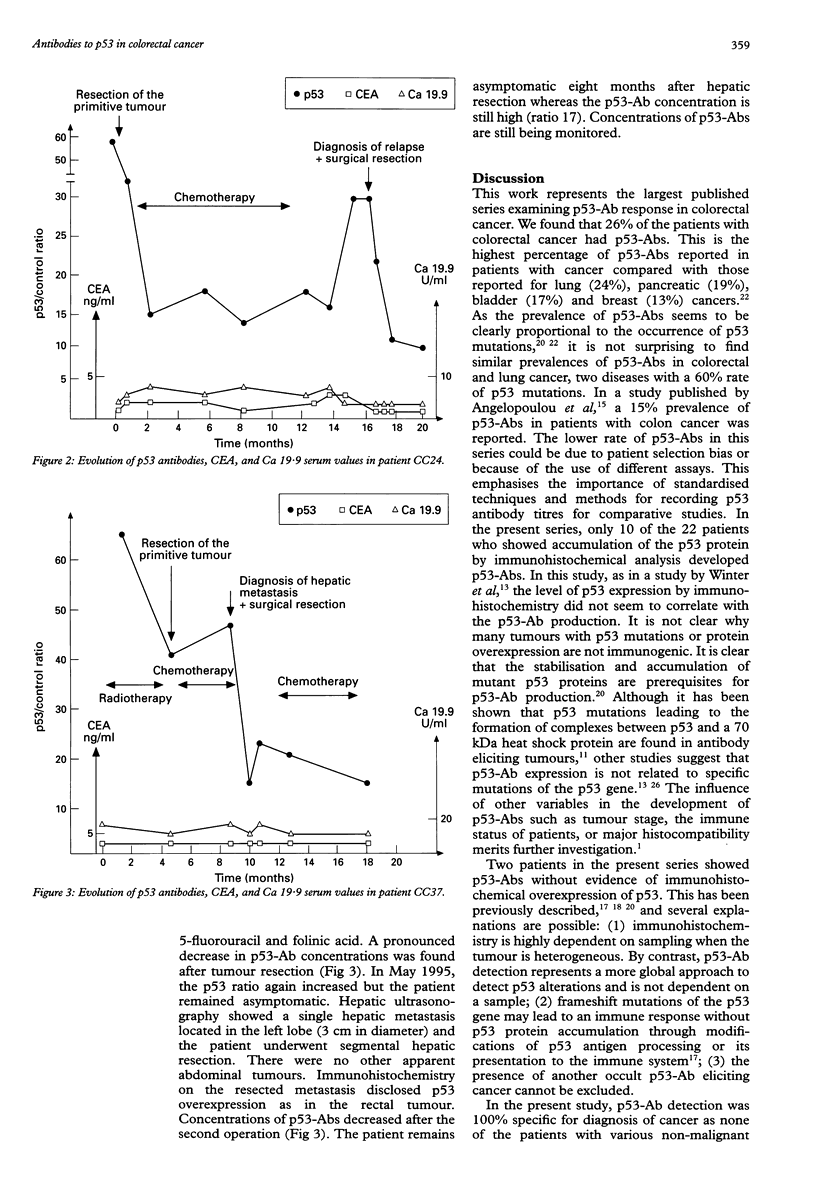
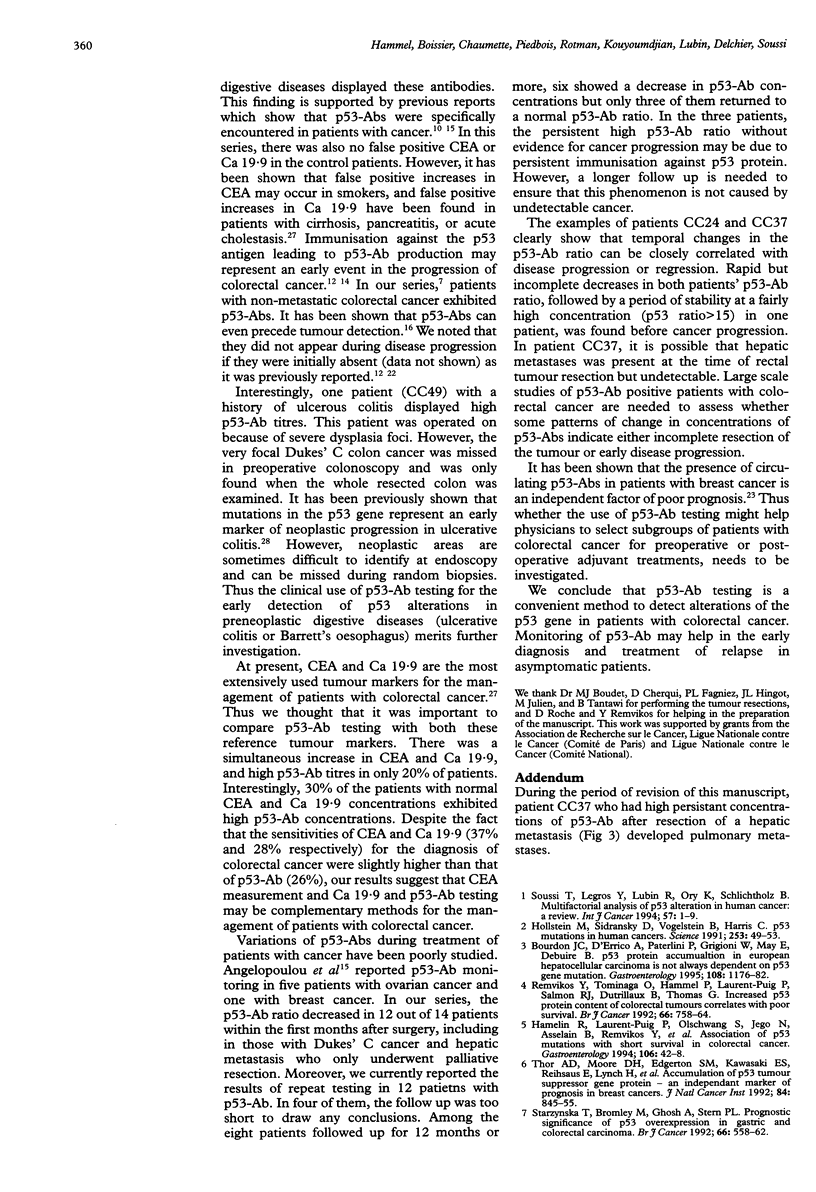
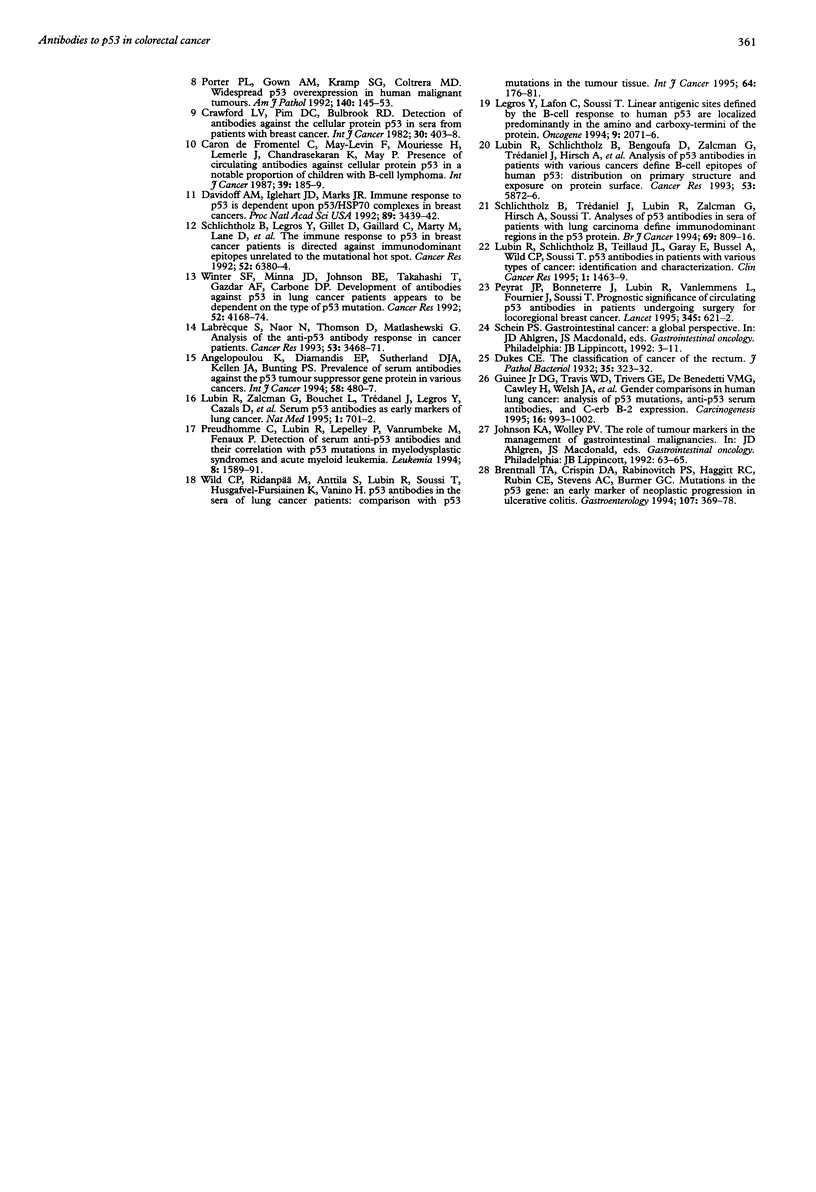
Selected References
These references are in PubMed. This may not be the complete list of references from this article.
- Angelopoulou K., Diamandis E. P., Sutherland D. J., Kellen J. A., Bunting P. S. Prevalence of serum antibodies against the p53 tumor suppressor gene protein in various cancers. Int J Cancer. 1994 Aug 15;58(4):480–487. doi: 10.1002/ijc.2910580404. [DOI] [PubMed] [Google Scholar]
- Bourdon J. C., D'Errico A., Paterlini P., Grigioni W., May E., Debuire B. p53 protein accumulation in European hepatocellular carcinoma is not always dependent on p53 gene mutation. Gastroenterology. 1995 Apr;108(4):1176–1182. doi: 10.1016/0016-5085(95)90217-1. [DOI] [PubMed] [Google Scholar]
- Brentnall T. A., Crispin D. A., Rabinovitch P. S., Haggitt R. C., Rubin C. E., Stevens A. C., Burmer G. C. Mutations in the p53 gene: an early marker of neoplastic progression in ulcerative colitis. Gastroenterology. 1994 Aug;107(2):369–378. doi: 10.1016/0016-5085(94)90161-9. [DOI] [PubMed] [Google Scholar]
- Caron de Fromentel C., May-Levin F., Mouriesse H., Lemerle J., Chandrasekaran K., May P. Presence of circulating antibodies against cellular protein p53 in a notable proportion of children with B-cell lymphoma. Int J Cancer. 1987 Feb 15;39(2):185–189. doi: 10.1002/ijc.2910390211. [DOI] [PubMed] [Google Scholar]
- Caron de Fromentel C., May-Levin F., Mouriesse H., Lemerle J., Chandrasekaran K., May P. Presence of circulating antibodies against cellular protein p53 in a notable proportion of children with B-cell lymphoma. Int J Cancer. 1987 Feb 15;39(2):185–189. doi: 10.1002/ijc.2910390211. [DOI] [PubMed] [Google Scholar]
- Crawford L. V., Pim D. C., Bulbrook R. D. Detection of antibodies against the cellular protein p53 in sera from patients with breast cancer. Int J Cancer. 1982 Oct 15;30(4):403–408. doi: 10.1002/ijc.2910300404. [DOI] [PubMed] [Google Scholar]
- Davidoff A. M., Iglehart J. D., Marks J. R. Immune response to p53 is dependent upon p53/HSP70 complexes in breast cancers. Proc Natl Acad Sci U S A. 1992 Apr 15;89(8):3439–3442. doi: 10.1073/pnas.89.8.3439. [DOI] [PMC free article] [PubMed] [Google Scholar]
- Guinee D. G., Jr, Travis W. D., Trivers G. E., De Benedetti V. M., Cawley H., Welsh J. A., Bennett W. P., Jett J., Colby T. V., Tazelaar H. Gender comparisons in human lung cancer: analysis of p53 mutations, anti-p53 serum antibodies and C-erbB-2 expression. Carcinogenesis. 1995 May;16(5):993–1002. doi: 10.1093/carcin/16.5.993. [DOI] [PubMed] [Google Scholar]
- Guinee D. G., Jr, Travis W. D., Trivers G. E., De Benedetti V. M., Cawley H., Welsh J. A., Bennett W. P., Jett J., Colby T. V., Tazelaar H. Gender comparisons in human lung cancer: analysis of p53 mutations, anti-p53 serum antibodies and C-erbB-2 expression. Carcinogenesis. 1995 May;16(5):993–1002. doi: 10.1093/carcin/16.5.993. [DOI] [PubMed] [Google Scholar]
- Hamelin R., Laurent-Puig P., Olschwang S., Jego N., Asselain B., Remvikos Y., Girodet J., Salmon R. J., Thomas G. Association of p53 mutations with short survival in colorectal cancer. Gastroenterology. 1994 Jan;106(1):42–48. doi: 10.1016/s0016-5085(94)94217-x. [DOI] [PubMed] [Google Scholar]
- Hollstein M., Sidransky D., Vogelstein B., Harris C. C. p53 mutations in human cancers. Science. 1991 Jul 5;253(5015):49–53. doi: 10.1126/science.1905840. [DOI] [PubMed] [Google Scholar]
- Labrecque S., Naor N., Thomson D., Matlashewski G. Analysis of the anti-p53 antibody response in cancer patients. Cancer Res. 1993 Aug 1;53(15):3468–3471. [PubMed] [Google Scholar]
- Legros Y., Lafon C., Soussi T. Linear antigenic sites defined by the B-cell response to human p53 are localized predominantly in the amino and carboxy-termini of the protein. Oncogene. 1994 Jul;9(7):2071–2076. [PubMed] [Google Scholar]
- Lubin R., Schlichtholz B., Bengoufa D., Zalcman G., Trédaniel J., Hirsch A., Caron de Fromentel C., Preudhomme C., Fenaux P., Fournier G. Analysis of p53 antibodies in patients with various cancers define B-cell epitopes of human p53: distribution on primary structure and exposure on protein surface. Cancer Res. 1993 Dec 15;53(24):5872–5876. [PubMed] [Google Scholar]
- Lubin R., Schlichtholz B., Teillaud J. L., Garay E., Bussel A., Wild C. P. p53 antibodies in patients with various types of cancer: assay, identification, and characterization. Clin Cancer Res. 1995 Dec;1(12):1463–1469. [PubMed] [Google Scholar]
- Lubin R., Zalcman G., Bouchet L., Trédanel J., Legros Y., Cazals D., Hirsch A., Soussi T. Serum p53 antibodies as early markers of lung cancer. Nat Med. 1995 Jul;1(7):701–702. doi: 10.1038/nm0795-701. [DOI] [PubMed] [Google Scholar]
- Peyrat J. P., Bonneterre J., Lubin R., Vanlemmens L., Fournier J., Soussi T. Prognostic significance of circulating P53 antibodies in patients undergoing surgery for locoregional breast cancer. Lancet. 1995 Mar 11;345(8950):621–622. doi: 10.1016/s0140-6736(95)90523-5. [DOI] [PubMed] [Google Scholar]
- Porter P. L., Gown A. M., Kramp S. G., Coltrera M. D. Widespread p53 overexpression in human malignant tumors. An immunohistochemical study using methacarn-fixed, embedded tissue. Am J Pathol. 1992 Jan;140(1):145–153. [PMC free article] [PubMed] [Google Scholar]
- Preudhomme C., Lubin R., Lepelley P., Vanrumbeke M., Fenaux P. Detection of serum anti p53 antibodies and their correlation with p53 mutations in myelodysplastic syndromes and acute myeloid leukemia. Leukemia. 1994 Sep;8(9):1589–1591. [PubMed] [Google Scholar]
- Remvikos Y., Tominaga O., Hammel P., Laurent-Puig P., Salmon R. J., Dutrillaux B., Thomas G. Increased p53 protein content of colorectal tumours correlates with poor survival. Br J Cancer. 1992 Oct;66(4):758–764. doi: 10.1038/bjc.1992.352. [DOI] [PMC free article] [PubMed] [Google Scholar]
- Schlichtholz B., Legros Y., Gillet D., Gaillard C., Marty M., Lane D., Calvo F., Soussi T. The immune response to p53 in breast cancer patients is directed against immunodominant epitopes unrelated to the mutational hot spot. Cancer Res. 1992 Nov 15;52(22):6380–6384. [PubMed] [Google Scholar]
- Schlichtholz B., Trédaniel J., Lubin R., Zalcman G., Hirsch A., Soussi T. Analyses of p53 antibodies in sera of patients with lung carcinoma define immunodominant regions in the p53 protein. Br J Cancer. 1994 May;69(5):809–816. doi: 10.1038/bjc.1994.159. [DOI] [PMC free article] [PubMed] [Google Scholar]
- Soussi T., Legros Y., Lubin R., Ory K., Schlichtholz B. Multifactorial analysis of p53 alteration in human cancer: a review. Int J Cancer. 1994 Apr 1;57(1):1–9. doi: 10.1002/ijc.2910570102. [DOI] [PubMed] [Google Scholar]
- Starzynska T., Bromley M., Ghosh A., Stern P. L. Prognostic significance of p53 overexpression in gastric and colorectal carcinoma. Br J Cancer. 1992 Sep;66(3):558–562. doi: 10.1038/bjc.1992.314. [DOI] [PMC free article] [PubMed] [Google Scholar]
- Thor A. D., Moore DH I. I., Edgerton S. M., Kawasaki E. S., Reihsaus E., Lynch H. T., Marcus J. N., Schwartz L., Chen L. C., Mayall B. H. Accumulation of p53 tumor suppressor gene protein: an independent marker of prognosis in breast cancers. J Natl Cancer Inst. 1992 Jun 3;84(11):845–855. doi: 10.1093/jnci/84.11.845. [DOI] [PubMed] [Google Scholar]
- Wild C. P., Ridanpä M., Anttila S., Lubin R., Soussi T., Husgafvel-Pursiainen K., Vainio H. p53 antibodies in the sera of lung cancer patients: comparison with p53 mutation in the tumour tissue. Int J Cancer. 1995 Jun 22;64(3):176–181. doi: 10.1002/ijc.2910640306. [DOI] [PubMed] [Google Scholar]
- Winter S. F., Minna J. D., Johnson B. E., Takahashi T., Gazdar A. F., Carbone D. P. Development of antibodies against p53 in lung cancer patients appears to be dependent on the type of p53 mutation. Cancer Res. 1992 Aug 1;52(15):4168–4174. [PubMed] [Google Scholar]


